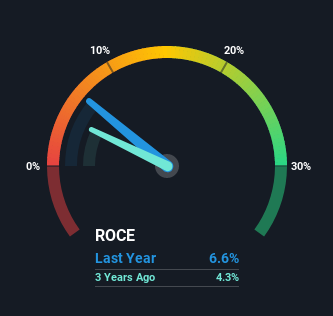If you're looking for a multi-bagger, there's a few things to keep an eye out for. Firstly, we'd want to identify a growing return on capital employed (ROCE) and then alongside that, an ever-increasing base of capital employed. Put simply, these types of businesses are compounding machines, meaning they are continually reinvesting their earnings at ever-higher rates of return. Having said that, from a first glance at Yonwoo (KOSDAQ:115960) we aren't jumping out of our chairs at how returns are trending, but let's have a deeper look.
What is Return On Capital Employed (ROCE)?
Just to clarify if you're unsure, ROCE is a metric for evaluating how much pre-tax income (in percentage terms) a company earns on the capital invested in its business. The formula for this calculation on Yonwoo is:
Return on Capital Employed = Earnings Before Interest and Tax (EBIT) ÷ (Total Assets - Current Liabilities)
0.066 = ₩16b ÷ (₩289b - ₩48b) (Based on the trailing twelve months to December 2020).
Therefore, Yonwoo has an ROCE of 6.6%. In absolute terms, that's a low return, but it's much better than the Packaging industry average of 5.5%.
See our latest analysis for Yonwoo

In the above chart we have measured Yonwoo's prior ROCE against its prior performance, but the future is arguably more important. If you'd like to see what analysts are forecasting going forward, you should check out our free report for Yonwoo.
What The Trend Of ROCE Can Tell Us
In terms of Yonwoo's historical ROCE movements, the trend isn't fantastic. To be more specific, ROCE has fallen from 11% over the last five years. Given the business is employing more capital while revenue has slipped, this is a bit concerning. If this were to continue, you might be looking at a company that is trying to reinvest for growth but is actually losing market share since sales haven't increased.
The Key Takeaway
From the above analysis, we find it rather worrisome that returns on capital and sales for Yonwoo have fallen, meanwhile the business is employing more capital than it was five years ago. It should come as no surprise then that the stock has fallen 35% over the last five years, so it looks like investors are recognizing these changes. With underlying trends that aren't great in these areas, we'd consider looking elsewhere.
While Yonwoo doesn't shine too bright in this respect, it's still worth seeing if the company is trading at attractive prices. You can find that out with our FREE intrinsic value estimation on our platform.
While Yonwoo isn't earning the highest return, check out this free list of companies that are earning high returns on equity with solid balance sheets.
If you're looking for stocks to buy, use the lowest-cost* platform that is rated #1 Overall by Barron’s, Interactive Brokers. Trade stocks, options, futures, forex, bonds and funds on 135 markets, all from a single integrated account. Promoted
New: Manage All Your Stock Portfolios in One Place
We've created the ultimate portfolio companion for stock investors, and it's free.
• Connect an unlimited number of Portfolios and see your total in one currency
• Be alerted to new Warning Signs or Risks via email or mobile
• Track the Fair Value of your stocks
This article by Simply Wall St is general in nature. It does not constitute a recommendation to buy or sell any stock, and does not take account of your objectives, or your financial situation. We aim to bring you long-term focused analysis driven by fundamental data. Note that our analysis may not factor in the latest price-sensitive company announcements or qualitative material. Simply Wall St has no position in any stocks mentioned.
*Interactive Brokers Rated Lowest Cost Broker by StockBrokers.com Annual Online Review 2020
Have feedback on this article? Concerned about the content? Get in touch with us directly. Alternatively, email editorial-team (at) simplywallst.com.
About KOSDAQ:A115960
Yonwoo
Yonwoo Co. Ltd, a packaging company, manufactures and sells cosmetic dispenser pumps for skin and personal care markets in Korea and internationally.
Excellent balance sheet and overvalued.
Market Insights
Community Narratives




